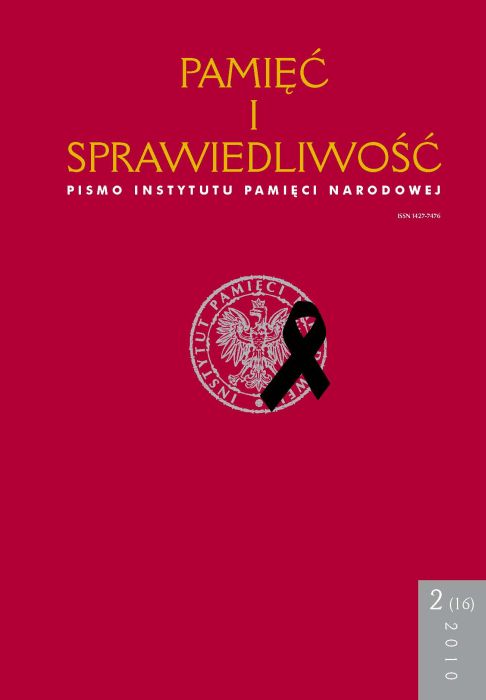Jakub Berman. Portret politycznego emeryta w materiałach SB (1966–1971)
Pamięć i Sprawiedliwość, Vol. 16 No 2 (2010), pages: 353-388
Publication date: 2010-12-30
Résumé
The PRL leaderships’ private life was one of their best-kept secrets. Hardly had they retired (voluntarily or compulsorily) form being politicians, when deep silence fell over them. Jakub Berman, who between 1948–1956 was the closest aide, collaborator and adviser of the PZPR leader Bolesław Bierut was eventually treated in a way as mentioned above. After being dismissed from the party in 1957, he officially stopped existing in political circles. He simply vanished and in consequence, he never faced trial for crimes committed either with his agreement
or on his own initiative.
In the 1960s, Jakub Berman was under Security Service’s surveillance therefore, he was carefully watched and eavesdropped. He attracted this interest as a potential – which sounds bizarrely – party follower of the Revisionist Zionism.
Berman used to “politicise” at his home so he was constantly visited by particular interlocutors. They altogether were provided with various subjects for those discussions. They were derived from newspapers, radio programmes (especially Radio Free Europe which was very often listened to in the Bergmans’ home), television and the latest editions of the journal “Le Monde” which the most interesting articles Berman used to read aloud. Regardless of the fact that almost nobody among his guests still kept political influence, their discussions – of the retired communist politician like Berman and of his friends – proved a long-lasting existence of an intellectual vitality and activity of their brains.
Constant surveillance Berman was put under, was rather fruitless, however, between 1966–1971, the Security Service intensified its efforts. The operational files that the SB managed to gather, provided their readers with basic information on Berman’s and his guests’ personal opinions on many problems, such as: future of the World and Europe, perspectives on the development and transformation of the communist ideology and practice, political and social crisis in 1968 and 1970, assassination of Jan Gerhard, the Arab-Israeli conflict, personality of Władysław
Gomułka and Edward Gierek. It was highly probable, that being aware of living in wired house, Jakub Berman practised a self-censorship. As a political retiree, Berman modernized his hitherto point of view – remaining communist, he stopped being a pragmatist. What is more and very interesting, all his family
members along with himself, they used to talk about party leaders by using words “they” or “those”, thereby showing that it was no longer their party; yet, they – as communists – toed its line.
Articles les plus lus par le même auteur ou la même autrice
- Robert Spałek, Władysław Gomułka i „problem niemiecki” (refleksje do biografii polityka) , Pamięć i Sprawiedliwość: Vol. 42 No 2 (2023)
- Robert Spałek, Statut Biura Specjalnego MBP , Pamięć i Sprawiedliwość: Vol. 32 No 2 (2018)
- Robert Spałek, Z dziejów komunistycznego wywiadu. Casus Bogusława Hrynkiewicza i Mariana Spychalskiego (1940–1944) , Pamięć i Sprawiedliwość: Vol. 12 No 1 (2008)
- Robert Spałek, [Recenzja] W odpowiedzi Krzysztofowi Wyszkowskiemu , Pamięć i Sprawiedliwość: Vol. 6 No 2 (2004)
- Robert Spałek, Włodzimierz Domagalski, [Recenzja] Robert Spałek, Warszawska ulica w stanie wojennym. Demonstracje, protesty, zamieszki, pochody w oczach opozycji i władzy 1981–1983, Wspólnota Samorządowa Województwa Mazowieckiego, Warszawa 2008 s. 266. , Pamięć i Sprawiedliwość: Vol. 15 No 1 (2010)
- Robert Spałek, [Recenzja] W odpowiedzi na recenzję Włodzimierza Domagalskiego , Pamięć i Sprawiedliwość: Vol. 15 No 1 (2010)
- Robert Spałek, „Gracze” – Komitet Obrony Robotników w propagandzie PRL, stereotypach oraz dokumentach Ministerstwa Spraw Wewnętrznych , Pamięć i Sprawiedliwość: Vol. 4 No 2 (2003)
- Robert Spałek, Założenia, przebieg i cele naukowo-edukacyjne konferencji „Sprzeczne narracje. Historia powojennej Polski”, zorganizowanej przez Oddziałowe Biuro Badań Historycznych IPN w Warszawie 19–20 stycznia 2017 roku , Pamięć i Sprawiedliwość: Vol. 30 No 2 (2017)
 Język Polski
Język Polski
 English
English
 Deutsch
Deutsch
 Français (France)
Français (France)
 Italiano
Italiano
 Русский
Русский


 PDF (Język Polski)
PDF (Język Polski)
